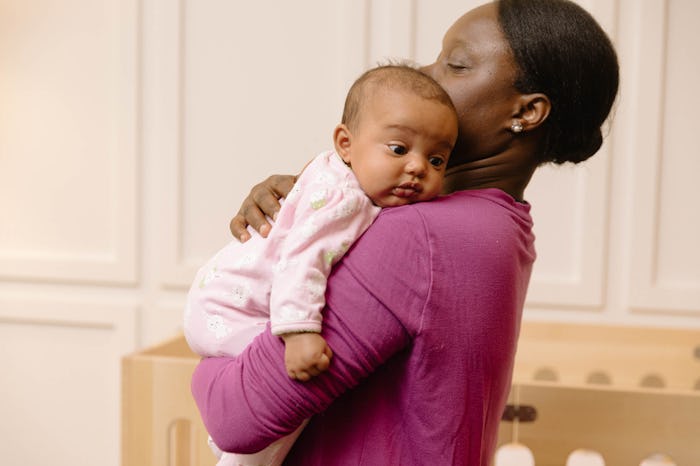Life
There's A Really Important Reason Why Your Baby Loves Snoozing On Your Shoulder
There's just nothing like snuggling with a squishy newborn. The combination of the sweet smell, deep breathing, and perfect contentment is a sensation unmatched by anything else I've known. And since every parent knows that the phrase "sleeping like a baby" is tragically inaccurate, those moments are truly priceless. But it's not just cozy for us parents; most babies would prefer nothing less than sleeping right up against you for every nap. And according to experts? It may be less about sheer physical comfort than you think. There are good reasons why your baby likes sleeping on your shoulder, and they're pretty fascinating.
"Babies have spent the previous nine months in a warm womb, tightly swaddled, with lots of noise," explains pediatrician Dr. Gina Posner in an interview with Romper. "When they come out into the world, temperatures vary, they have a strong startle reflex that wakes them frequently, and they are no longer in constant contact with their mom. Sleeping on a parent helps regulate their body temperature and allows them to hear mom’s heartbeat, which is very soothing."
Licensed psychotherapist Dr. Mayra Mendez agrees that sleeping on mom or dad gives the baby a sense of security and has been shown to physiologically decrease their anxiety and distress. "The warm, soft body of a nurturing and responsive caregiver is by far preferable to the coldness of a crib," she tells Romper. "A crib might be safe, but the physical contact with a parent provides the warmth, affect, touch, and reassuring sounds of the heartbeat and breathing that babies prefer."
According to Mendez, these sleep associations are critically important for a baby because secure attachment is promoted by multi-sensory messages between an infant and caregiver. When your baby sleeps on your shoulder, he is receiving touch, sound, nurture, responsiveness to needs, and reflecting positive effect.
"Babies receive a tremendous amount of affection from sleeping with and on their caregivers," Mendez tells Romper. "The physical connection is reassuring and safe, as the sensation of touch is highly soothing to young babies. Sleeping on a parent provides boundaries of security and affirms for the baby that the caregiver is present, available and responsive."
Mendez notes that there has been extensive literature and research that speaks to the power to warmth and physical contact as enriching to a baby’s capacity for attachment, noting famed psychologists Bowlby and Harlow, to name a few.
That being said, co-sleeping is not the only way to give your baby a secure attachment. The American Academy of Pediatrics does not promote co-sleeping or letting baby falling asleep on a tired mother because there is increased risk of injury or suffocation.
Behavioral sleep psychologist Dr. Lynelle Schneeberg says she often sees parents confuse attachment with sleep dependency, which can be detrimental to a child's development. "The problem with this dependence (of needing to be on or beside a parent to fall asleep) is that it often leads to sleep deprivation for both baby and parent. It's best, after the age of 6 months or so, to teach a baby to self-soothe in a crib after a cozy consistent bedtime routine each night," she tells Romper.
Thankfully, the conversation surrounding safe and healthy sleep habits and secure attachment is not one that demands an either/or answer. Parents can compassionately meet the physical and emotional needs of their children while also keeping them safe and instilling healthy sleep habits.
Get as many newborn snuggles as you can while they're tiny, and about halfway through the first year experts say it's OK to gently let them learn to fall asleep on their own. Physical touch, cuddling, and affection never stop being critically important, but they can be part of the sleepy time routine rather than the entire routine itself.
